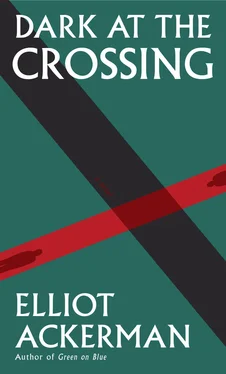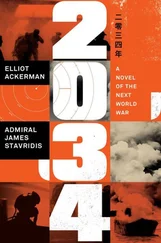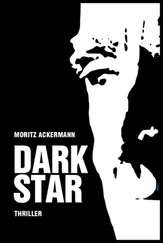Light from the new mall spilled into Antep City Park, scuttling the refugees deeper into the sanctuary of its dim confines. The Anatolian bungalows of the old city skirted the lowest of its five stories. A neon sign, each letter large as a car, proclaimed: SANKO PARK. The sign glowed brightest at the mall’s entrance, where a pair of revolving doors sealed in the hermetic freshness of Tommy Hilfiger, Marks & Spencer and the Apple Store.
On the ground floor, Big Chefs’ open-air terrace was fenced in glass. Heating lamps burned in every corner, and white-aproned waiters handed out red wool blankets for the patrons to drape over their shoulders. Clustered in booths and around four-top tables, an international clientele of aid workers, entrepreneurs and well-heeled refugees hunched over meals ordered off a menu that was just as varied — everything from plates of pepperoni pizza to bowls of manti, a Kurdish dumpling in yogurt sauce. The dining room felt like the mess tent of some khaki-clad expedition. Though the patrons dressed to a type, Haris could pick out each nationality by their shoes. The eastern Europeans wore leather oxfords or loafers with dust in the creases, and the Syrians wore obscurely branded cross-trainers like LA Gear or British Knights, while the Americans and the western Europeans wore high-tech trekking boots worth one month of a local Turk’s salary. Conversations about humanitarian missions, about politics, about the revolution, rose up from the tables, blending into the single noise of a half-dozen languages that when heard as a whole made one undecipherable clamor, like an apathetic groan, a sound conveying nothing. With Haris by his side, Amir stood at the terrace’s threshold surveying the restaurant. Although Amir looked for his wife, he seemed in no hurry to find her. His gaze crept over the crowd, as if hoping he might see someone else he knew.
She sat at a corner table by the glass wall. Above her head she waved lazily, a cigarette’s smoke tracing the arced motion of her wrist, her friend sitting across from her. Haris noticed them first and touched Amir on the arm, pointing to the pair. Amir glanced in their direction, but for a moment didn’t move. He swept his eyes over one last corner of the restaurant. Then he waved back and went to meet his wife.
When they came to her table she stubbed out her cigarette and stood, offering her hand to Haris. He noticed she was just a bit taller than him, like his sister, and taller than Amir. She introduced herself as Daphne, speaking the e with a Gallic accent, as though its pronunciation were a cherished ornament. A pair of lipstick-red sunglasses perched on her head, and a matching red blanket was draped across her narrow shoulders. Beneath it, she wore a stylish ice-blue trench coat. Set above high cheekbones, her mascaraed eyes matched the trench coat and burned cold, reminding Haris of the little girl in the photo. She wore a nose ring, a spec of quartz set in a tiny stud, and each of her words came with a certain force, spoken from a square jaw any boxer would’ve been proud to have. The roots of her hair were brown, the tips faded naturally to blond. On a woman of less interesting heritage they would’ve looked dyed and grown out, but later Haris would learn her mother had been French, her father a Damascene. With her strong features, Haris imagined she looked like her father.
The young woman across from Daphne also stood, turning to face Amir.
“Latia,” he said. “You made it to Antep.”
“Daphne met me at the bus station this morning. I needed to give her something.”
Amir didn’t ask what the something was, and Haris noticed he practically ignored his wife. Instead, he leaned in and kissed this old acquaintance on either cheek, brushing his body against hers. Latia stepped back, sitting down again. Her full, round eyes flitted to the ground and then returned to Amir, their lashes cupping toward her eyebrows. She lacked Daphne’s elegance. Her face’s unrefined features appeared as if a sculptor with thick thumbs had molded them. Her long hair was cut with bangs, like she had done the job herself, snipping a curtain so she might see.
Amir remained beside her, refusing to turn away, his gaze filled with a sleepy sort of cunning. “You look wonderful,” he said, taking the seat next to her.
“Of course she does,” answered Daphne. “She’s slimmed down. Too much time in Aleppo.”
Latia’s eyes wandered out the window, absently shifting between the city’s lights and the park’s dark interior.
As Haris sat next to Daphne, her eyes fixed on his sweater. “This looks familiar,” she said to Amir.
“Some gendarmes gave Haris a rough time,” he said.
“You’re Syrian?” Daphne gestured to Haris’s reddish hair.
“He’s American,” answered Amir.
“I wouldn’t have taken you for an American,” she said.
“I’m also Iraqi,” said Haris.
“Is that the same as being American these days?” Daphne said, and then glanced across the table and explained that Latia was a Syrian, and also a dear friend who had attended the University of Aleppo with Amir and her. They’d all met in an elective on English literature. “What did we read? Oh yes, Emma, ” said Daphne. She turned to Haris and explained: “Amir found it dull, the characters’ obsession with manners. I loved it, however.” Then Daphne described how Latia, who’d studied nursing, dropped out of the medical institute after the second semester. “They had to do dissections of cadavers. I wouldn’t have made it past the first one either.” Again she turned to Haris. “Such unpleasant subject matter.”
“Unpleasant?” interrupted Amir. “You spend all your time at that damn Delvet Hospital.”
Daphne lit another cigarette. “It’s the idea of surgery that I find unpleasant, not the patients,” she replied, taking a drag. “I translate for the Syrian families there,” she added, glancing back at Haris and Latia.
Daphne then explained that Latia was on her way to Payas, a Turkish resort town along the Mediterranean coast where her uncle rented an apartment. Latia had hired a fixer to take her from Aleppo to Kilis, and then she’d taken a bus from Kilis to Antep. In the morning, she would take a final bus from Antep to Payas.
“That’s an expensive journey,” Haris said.
Latia said nothing. She looked at Amir, who now answered for her: “I imagine it took a while to save up the money.” To which Latia nodded.
“Leaving is a difficult decision,” said Daphne, flicking the ashes from her cigarette. Then she pointed the cherry end at Amir. “Though more difficult for some than for others.”
Latia crossed her hands on the table. She picked at her thumb where a cuticle jutted up like a loose floorboard.
“Nothing’s easy about this,” said Amir.
Latia’s scooping lashes beat furiously as she listened to Amir and Daphne bicker. From her lower lip, she blew up at her bangs, clearing them from her eyes. The waiter interrupted the deteriorating conversation with the day’s specials. Everyone passed along their orders to Daphne, who translated them into Turkish.
Amir added a bottle of raki to the meal.
The waiter disappeared toward the kitchen. The table became quiet. “I stayed for my cats,” mumbled Latia.
Haris glanced at her.
“For your cats?” asked Daphne, the cold in her blue eyes coming out.
Latia shifted in her seat, fishing something from her pocket.
“How many cats?” asked Haris.
She took out a Polaroid. Haris barely considered the rust-colored creature, its eyes big and weepy. What he noticed was the writing on the Polaroid’s white tab, the same long, snaking Arabic he’d seen scrawled across the bottom of the photo tucked in Daphne’s notebook, the one of the unmarked grave.
Читать дальше












